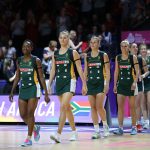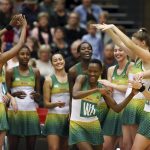Africa shines at Netball World Cup
Zimbabwe’s captain Perpetua Siyachitema says that netball should be considered Africa’s best sport. Statistics and African nations’ performance in the Netball World Cup supports that argument.…
Author:
23 July 2019

With four African nations securing positions among the top eight in the just concluded 16-team Netball World Cup, there should be no doubt as to which is the best team sport on the continent. South Africa lost a dramatic semifinal by two points against Australia and then fell to hosts England in the third-place playoff. Despite that, the Spar Proteas achieved their best result at the global showpiece since 1995. Not far behind the fourth-placed Proteas were Malawi (6), Uganda (7) and debutants Zimbabwe (8).
No other team sport can boast of such a similarly strong African contingent. In football, only Cameroon (1990), Senegal (2002) and Ghana (2010) have qualified for the quarterfinals in the men’s tournament while Nigeria are the only women’s team to reach the last eight, doing so in 1999.
Related article:
In other sports there is a more dramatic dearth of African representation in the latter stages of World Cups. Only South Africa have reached the knockout stages in rugby union or cricket. Despite Kenya’s illustrious pedigree in middle and long distance running, when serving as a collective, two semifinals in 2009 and 2013 at the Rugby World Cup Sevens is the most that the east African nation can boast about.
“There is no question that netball should be considered Africa’s best sport,” Zimbabwe’s captain Perpetua Siyachitema defiantly told New Frame during her country’s first-ever World Cup appearance. “We have shown that there is talent on the continent. All other teams in the tournament know about us. They respect us and they congratulate us when we do well. They understand what we bring. Our hope is that we can show the people back home what we are about and that we can help develop the sport.”
Money ‘does not determine your fate’
As with many things in Africa when competing on the global stage, funding is a challenge in netball. Zimbabwe’s struggle was particularly daunting. Long-term coach Lloyd Mukunde, who has steered the Gems for 22 years, has often had to use his own money to buy much-needed training equipment.
Even weeks before the team was scheduled to jet off to Liverpool to take part in the tournament, appeals to corporate sponsors and crowdfunding efforts were going on as funds trickled in. And while competitors in the Australian, New Zealand and English squads enjoyed the comforts of comparatively luxurious hotels, Siyachitema’s side had to make do on a shoestring budget, doubling up in modest rooms overlooking a highway.
Related article:
“We know we are at a disadvantage when it comes to how much money we have, but that does not determine your fate,” Siyachitema said. “We know that other teams have better access to equipment, sleep in nicer hotels and have more players who are professional. But what we have is unique to Africa. We have the flair, we have the desire, we have the passion. When we play we are not just playing for ourselves or even just for Zimbabwe. We are playing for the whole of Africa. No other confederation feels the same way we feel as Africans.”
This sentiment is shared in the other camps. Uganda’s team manager Jocelyn Ucanda often stresses the importance of drawing inspiration from the success of fellow African teams and encourages her players to interact with their counterparts from South Africa, Malawi and Zimbabwe.
The African way
“It is the best way to learn,” Ucanda said. “That is the African way. There is camaraderie between all of us. We make a point of wishing the other teams well and even if we get beaten by another African team we want them to progress.”
This was not mere lip service. Uganda’s She-Cranes competed against every other African nation with mixed results. First, in the second-preliminary round before the semifinals, they took on South Africa and went down 67-40.
“We were disappointed, obviously,” Ucanda said. “But we knew that South Africa would represent us well in the next round and we were proud of them.”
Uganda lost their next match to an African contemporary, 55-44 to Malawi, which meant that they were winless from four matches against continental rivals in World Cups. A 58-47 victory over Zimbabwe in the seventh-eighth place playoff set that record straight and allowed the She-Cranes to fly back home proud of their work in the UK.
Related article:
“Our girls represented our country with great pride and I know they inspired many people,” Ucanda said. “But not just in Uganda. We finished seventh in a Work Cup! That is incredible. Malawi was sixth. Zimbabwe eighth. These are outstanding results when one considers most of our players are not professional.”
Most of Uganda’s squad is comprised of players who are simultaneously completing their studies at university. Some, as Ucanda put it, are “housewives” with a handful working a variety of jobs while balancing their athletic commitments. Only captain Peace Proscovia is a recognised professional, plying her trade for the Sunshine Coast Lightning in Australia’s Super Netball League.
“That does put us at a disadvantage,” Ucanda admits. “But we never make excuses. That just means we have to work harder than everyone else.”
South Africa’s fourth place finish underlines their continental supremacy and also points the advantages of having a competitive domestic league as well as a handful of professional players who have sharpened their skills abroad. Coached by the legendary Australian Norma Plummer and captained by the irrepressible Bongiwe Msomi, the Proteas bloodied the noses of more fancied opposition and were two semifinal points away from securing one of the most remarkable upsets in netball history.
The Spar Proteas, trailblazers in the continent
Further emphasising South Africa’s success was Karla Pretorius’s award as Player of the Tournament, following the nod to Erin Burger in 2011, and Lenize Potgieter ending the competition as the third highest points scorer, amassing 271 points.
But despite having their sights set on greater accomplishments in their quest to join the elite table of the netball world, the players and coaching staff consciously remain tethered to the continent they represent.
“No matter what we achieve, or how successful we may become, we will always be Africans,” Msomi said. “It gives us great pride knowing that we help put Africa on the map. In other team sports African countries don’t do very well as a collective at major tournaments. We are very proud to play a sport where that is the exception.”
Related article:
However, those sentiments of togetherness are trumped by a ruthless desire to remain at the pinnacle of the game. Like the leader of a fiefdom, Msomi is adamant that her Proteas continue their regional dominance for generations to come.
“We’ve always wanted to be the best team in Africa and that will always be the case,” the South African skipper said. “Any fixture against an African team gets us going. We know they see us as the big players on the scene and they come at us with everything they’ve got. We respect them and want them to do well but first and foremost we want to beat them. They push us and we push right back. That helps grow the game and makes us all better players.”
In 2023, the INF Netball World Cup will take place in Cape Town, the first time the event will touch down on African soil. The Confederation of African Netball Association, as the governing regional body is known, couldn’t have asked for a better platform to launch a four-year campaign to galvanise support and encourage economic growth in the sport. Netball is unquestionably the most successful team sport on the continent. The players know it. The diehard fans know it. Now, they’re hoping you do too.




